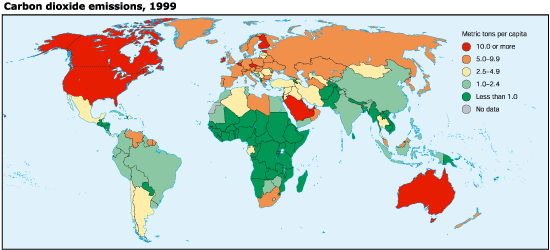- Water: China has problems with water shortage and the pollution of the water they already have. As of 2004, 70% of the country's natural water sources were polluted. This created a stir within China, leading to the building of the most dam projects in the world. BUT! With all of these new projects many ecological epicenters have been damaged, people have been displaced from their farms, and much of that farmland has been taken by the government...
- Land: As many presenters have discussed within the class desertification is a major obstacle the world must overcome in the near future. China is no stranger to this notion of losing most arable land in exchange for basically sand. In this case, over-grazing or excessive farm cultivation is the main cause for desertification. "Desertification also contributes to China's air pollution problems, with increasing dust causing a third of China's air pollution."
- As recent as 2008 China passed the U.S. on the scale for amount of greenhouse gases emitted into our atmosphere. China relies directly on coal and the energy production that comes with it.
- Population: "The country's growing economic prosperity and rapid development mean increasing urbanization, consumerism, and pollution." In short, economic prosperity = environmental degradation.
file:///Users/kevinhahn/Desktop/China%20article%202.doc
http://www.cfr.org/publication/12608/#p2
file:///Users/kevinhahn/Desktop/Chinese%20article.doc

China's rapid rate of development (20 years vs. 100 for the U.S. and Western Europe) seems proportional given that they are developing in a much more technologically and industrially advanced time period. While their rate of industrialization and urbanization is very high, this should not mean the U.S. should be regarding China as an opponent. The government of China is experiencing firsthand the environmental consequences of their development. By working with them instead of against them, a mutual agreement between China and other global powers could be reached to take international steps toward improved environmental treatment and sustainable growth.
ReplyDeleteIt is hard for the U.S. to make China take real reductions on emissions when we aren't exactly taking the lead on the issue in the world either. China may become more powerful then the U.S. in the coming decades which could turn into a power struggle.
ReplyDeleteI agree with both of you...but due to the recent struggles with U.S./China relations (Iraq sanctions, meeting with Dalai Lama, etc..) do you think that by us, the U.S., taking the lead on reducing greenhouse emissions will really have an impact on what China decides to do? And I am not saying that the U.S. should really consider China as a military opponent, but the environmental degradation that is taking place in major cities like Beijing could eventually take a toll on the O-zone unlike any other country. This is due to the fact that China (not a developed nation yet) is not required to reduce greenhouse gas emissions. So what should we do?
ReplyDeleteUltimately, they will either regulate, or some natural process will. Humans are K selective, and though we alter our carrying capacity with technology, there is certainly a limit to which our alterations can be effective. If China continues to grow at an unsustainable rate will lead to a mass die-off.
ReplyDeleteSammy, I understand that logic, however the issue is that China's actions are effecting other countries and populations unequally. The mass die-off that you mention will occur in the less wealthy / less developed nations that cannot protect themselves with money, even though they are not the ones creating the problem. It will not be the Chinese to die off, so how does this help / counteract the situation? This is another example of environmental racism where one countries actions are disproportionately at the expense of the survival of another.
ReplyDeleteChina is a very strong, powerful, and proud competitor. Perhaps we can give China more of an incentive to reduce emissions if we bring more media attention to the issue by comparing China's pollution to the U.S.'s and creating a competitive setting.
ReplyDeleteIt would be hard to tell China to reduce their emissions when we emit so much. China isn't going to reduce their emissions. They are rapidly developing and they want to become a powerful country. They are in the midst of their industrial revolution. It is cheaper for them just to produce goods and emit rather than abate them at this point. They do not have the same regulations that we do, and with the absence of these regulations, there is no reason to abate emissions, besides the environmental impacts, which they are obviously not focusing on.
ReplyDeleteThis is exactly why there needs to be a global effort for environmental protection. What one country does in their borders will effect everyone, and it is unjust for all industrialzed and developing nations to place the burden on less fossil fuel energy intensive countries. Although the Copenhagen Climate disscussion was a move in the right direction, future environmental meetings need to be more active in their conclusions and make effective policies with enforced regulations.
ReplyDeleteWe can't force China to do anything, and honestly, I think in many ways it would by hypocritical of us to even try, considering we're so severely in debt to them. Instead, why don't we lead by example. If we could actually create a viable, competitive market in alternative energy we might be able to decrease our debt and change the behavior of others. China might heading towards environmental disasters, but per capita their environmental impact is still much smaller than ours (for example, our CO2 emissions per capita is 19.1 metric tons while China's is 4.6 (for 2007, according to Wikipedia:).
ReplyDelete